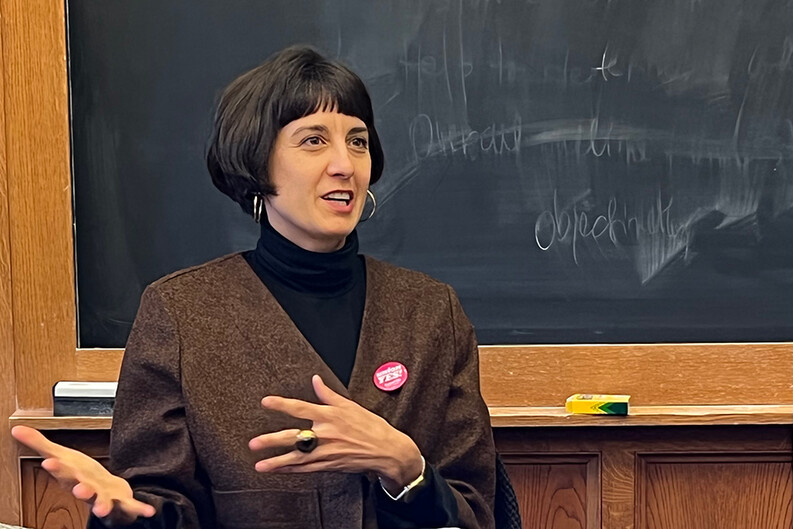Alyssa Battistoni Explores Democratic Decarbonization and the Green New Deal

The Orville H. Schell Jr. Center for International Human Rights welcomed Alyssa Battistoni to lead the Feb. 2 Human Rights Workshop4, “After Carbon Democracy: Towards Democratic Decarbonization.” Battistoni, Assistant Professor of Political Science at Barnard College, discussed the prospect of a democratic program for decarbonization as the world undergoes a green transition.
For decades, Battistoni explained, skeptics have warned that democratic electorates “will not accept the sacrifices necessary to reduce fossil fuel use under climate change.” According to this narrative, Battistoni explained, people will not choose to limit consumption on their own because it would require making drastic lifestyle changes for the benefit of distant strangers or future generations. Such thinkers cite pushback against policies raising the cost of fossil fuels — from the 2018 gilets jaunes in France to failures to pass a carbon tax in the U.S. — as evidence that democracy is ill-equipped to tackle climate change.
However, Battistoni rejected the notion that decarbonization and democracy are incompatible. She countered that “the problem isn’t too much democracy, but not enough.”
Battistoni explained that events like the protests in France should not be read as a straight-forward failure of democracy on climate. Rather, they indicate the limits of approaches that impose costs on communities who have “borne the brunt of an economic crisis and harm for many years … while failing to address the challenges of severe economic and social inequality along class and racial lines.”
While noting that views skeptical of democracy are popular, Battistoni said that other political theorists have argued that the climate crisis would be best addressed through a deeper commitment to democracy. Under this view, Battistoni said, decarbonization is enhanced through “a more robust commitment to deliberation and a wider sphere of participation,” as well as support for “genuinely global democracies and greater democratic accountability.”
As Battistoni explained, this vision of global democracy would look meaningfully different from the status quo, in which a small group of rich, powerful nation-states make decisions on behalf of the global community. She described how people across the world would have the power to engage in democratic action against fossil capital, as exemplified by Indigenous-led protests against the Keystone and Dakota Access Pipelines.
In her work, Battistoni looks to the Green New Deal — the 2019 proposal in the U.S. Congress to transform the fossil fuel economy into a green one — as a particularly promising program for addressing climate change through a greater commitment to democracy. Advocates of the Green New Deal hold that it is possible for climate action to be popular enough to succeed politically. Achieving this popularity, they argue, will require climate reforms that also address the harms people are experiencing in the present, especially communities of color and working-class communities.
As Battistoni explained, a core tenet of democratic decarbonization is that it must include a broad transformation of economy and society that benefits people now. This vision stands in contrast to the form of “green austerity” that skeptics have argued is incompatible with democracy. Instead of asking people to sacrifice for the future without benefit to themselves, the Green New Deal contends that climate action can bring about public abundance today.
The economic transformation the Green New Deal envisions has profound implications for labor, given societal reliance on fossil fuels. Battistoni stressed the importance of an invigorated labor movement to ensure that decarbonization efforts provide safeguards for workers’ livelihoods, including real investments in green jobs.
“We take particular inspiration from the model of organizing pioneered by teachers’ unions under the banner of bargaining for the common good,” Battistoni said, adding that these unions provide an instructive example because they organize “labor and communities together, and seek to win victories not only for workers, but also for the communities around them.”
The Green New Deal recognizes that climate change must be understood and addressed in tandem with other forms of social injustice, including the affordable housing crisis. At their best, Battistoni said, these efforts “connect decarbonization to the working-class struggle for affordable homes, effective transit, and public luxury,” allowing policymakers to imagine climate change solutions that directly aid communities.
Battistoni said that whether domestic Green New Deal efforts succeed will be critical not only for the United States, but for the possibility of achieving democratic decarbonization on a global scale.
“How we undergo a green transition in the U.S. matters for the world,” Battistoni said.


